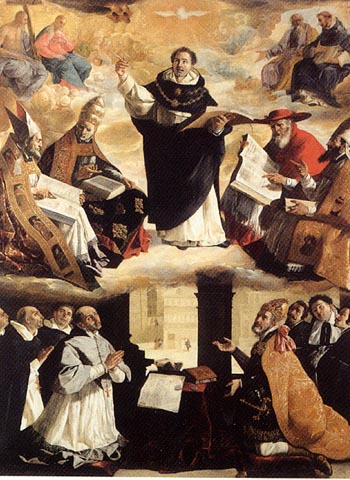 |
| "St Thomas, Count of Aquino, Dominican Friar and the Angelic Doctor of the Catholic Church understood hierarchy and taught popes and bishops, emperors and kings, how to exercise it." |
Add in a belief that, in the divine hierarchy, to be a priest is to be nearer God than the laity and yet to be a priest is to be but the shadow of a bishop's closeness to God, and you have a powerful, driving ideology which once achieved great things in the Church.
Yet it is an ideology which is now almost (not quite) intellectually and practically defunct.
The concept of formation remains significant, however, and deserves to be revisited. Just how do we form, shape, create disciples - lay, clerical and episcopal disciples - adequate to the tasks of mission, service, holiness in today's world? How do we form the whole church, not merely a top slice of it?
This is the perennial task of the church: to make real and consequential what it is to be a Christian today. To reverse this sentence: the way Christians act and speak (as Christians rather than as, say, engineers) is what it means to be Christian. Christians form the Church which formed them.
This is based on an epistemology profoundly antagonistic to the epistemology which saw the universe as fixed in a great pyramid stretching up towards God in which the most Godly humans stood just a feathers' breath below the angels.
.jpg) To the contrary, it is based on the understanding of a world continually coming into being, in which every moment closes down some possibilities and opens up new ones, in which beauty and passion are as important as facts and analysis, in which ideology (theology, world-view, common opinion) is an essential building block in the creation of organizations, and organizations are essential to the development of knowledge and understanding.
To the contrary, it is based on the understanding of a world continually coming into being, in which every moment closes down some possibilities and opens up new ones, in which beauty and passion are as important as facts and analysis, in which ideology (theology, world-view, common opinion) is an essential building block in the creation of organizations, and organizations are essential to the development of knowledge and understanding.That is: the Church is as the Church does. As the Church does, so its members corporately make real the idea of the Church that they embody and enact. Each action closes down some possibilities and opens others.
Clearly some decisions and actions have much more extensive and longer-lasting consequences. Some (do I need to mention the Covenant?) appear to be much more likely to close down options than to create new opportunities. The rhetoric of order and discipline is intended to signal that the desirable path of formation is to curtail and prevent innovation and new expressions of faith.
 |
| Fun in St Neots Church |
Though I would add quickly that I am not opposed to either discipline or order per se. I think both are necessary elements of any structure. I recognise the reality of sin in any church or group. I think, however, that when discipline is needed it will be because of some failure of the Church. The actions of discipline and the re-imposition of order should be seen as causes of shame and sorrow, occasions for repentance, not celebrated as guiding principles of the Communion.
I also suggest that the ontological hierarchy which so elevated bishops remains with us in a changed, and cheaper, version.
The Catholic tradition placed hierarchy on the foundation of divine law made visible in natural law. In the Anglican Church that foundation is (a somewhat dated) organizational thesis. The centralization of the Church, the elevation of the primates, the focusing of power in the General Secretary and the Archbishop of Canterbury, is being pursued for organizational efficacy: to better enable the control of member churches.
Surely we can do better than this.
No comments:
Post a Comment